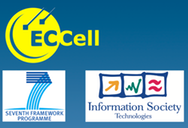Electronic Chemical Cells will be a basic unit in future molecular ICT
Programmable functionality is based on 3 generic core functions
a. replication, selective amplification of information
b. containment, selective retention, concentration, isolation and release
c. metabolism, selective activation and material enabling of processes
Electronic interfacing, programming and control of immersed system chemistry is a major application area of ECCell ICT
Hybrid entities with electronic parts and chemical parts to their information processing present an important novel form of ICT that may play a central role in extending the domain of ICT.
IT functionalities of ECCells include their application as
a. molecular thyristors : molecular input, amplified output
b. intelligent molecular mobility control units
c. active self-assembly control units
d. evolvable units in component production
e. integrating entities for encapsulating chemistry
f. components in complex (neural like) networks
g. a method to create programmable chemistry
The overarching metaphor is programmable construction.
ECCell is not trying to produce an abstract computational engine able to compute with silicon on abstract problem solving. Rather it provides information intensive ICT for complex nano-embedded problem solving.
